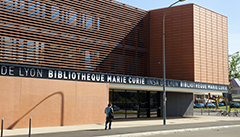
Sciences & Société
Soutenance de thèse : Théo LEULIET
Deep Learning for tomographic reconstruction: study and application to computed tomography and positron emission imaging
Doctorant : Théo LEULIET
Laboratoire INSA : CREATIS
Ecole doctorale : ED160 : Electronique, Electrotechnique, Automatique
The purpose of tomography is to reconstruct a volume from its projections. In Computed Tomography (CT), X-rays are transmitted to a patient and attenuated by their tissues: the projections are obtained from the measured attenuation. For Positron Emission Tomography (PET), a radionuclide injected inside a patient emits a positron that generates two gamma photons in opposite directions. The projections correspond to the set of lines of response between each pair of simultaneously detected photons. Tomographic reconstruction for PET or CT amounts to solving an inverse problem. Analytical methods are fast but their efficiency is limited when data are under-sampled or noisy. Iterative methods are efficient for noise and artefacts removal, but the computation time represents a major drawback for practical use. Deep learning based methods have the potential to overcome those limits. The first objective of this thesis is to study the impact of the training loss on medical diagnosis-oriented evaluation metrics. We perform this study on bone microarchitecture CT imaging and show that in this case L1 loss should be used regarding all the considered metrics. Networks trained with perceptual losses show better transcription of structural features, at the cost of a deteriorated resolution. Adversarial losses improve the accuracy of the reconstruction in terms of density distribution. We then focus on Time of Flight (TOF) PET data for intraoperative surgical applications; our aim is to design a reconstruction method to improve the detectability of small tumors in the context of breast cancer. We propose a neural network called PAVENET that simultaneously retrieves the image and the image- dependent point-spread function (PSF) from a poor-quality initial reconstruction. We present in this thesis the proof of concept for PAVENET with experiments on Monte-Carlo simulations reproducing acquisitions from an innovative detector studied in the Radiation Physics Instrumentation Laboratory (RPIL) in Boston.
Informations complémentaires
-
Amphithéâtre Emilie du Châtelet (Bibliothèque Marie Curie) - Villeurbanne

